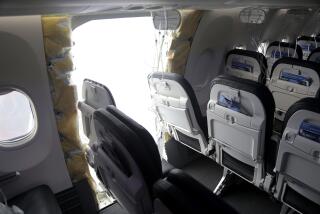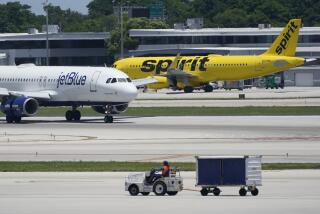Objections Likely on Commercial Aircraft Colossus : News analysis: Boeing-McDonnell might escape antitrust concerns on defense aircraft business.
Antitrust questions raised by any substantial merging of assets by Boeing Co. and McDonnell Douglas Corp. are likely to be focused more on the companies’ commercial aircraft lines than on their defense operations.
That’s because a merger of the two aerospace giants, or at least a melding of their commercial jetliner operations, would result in the United States’ having only one manufacturer of commercial aircraft.
At the same time, a marriage of their defense segments would probably get less scrutiny because they have little overlap and because the Department of Defense is encouraging its contractors to consolidate in the post-Cold War era of reduced Pentagon spending.
Boeing and McDonnell Douglas had no further comment Friday on their discussions, which were first disclosed Thursday. There has been no confirmation of exactly what transactions, including a full merger, are being considered. But if a deal is struck, it’s likely that the Federal Trade Commission--emboldened by an aggressive new chairman and a record of reviewing defense-industry mergers--would elbow aside the Justice Department and seek to review the matter on antitrust grounds.
The Defense Department also is likely to play a role in an antitrust investigation, under rules established last year that give the Pentagon a voice in reviews of defense-related industries and national security matters.
In the last 20 years, however, the government has challenged only four mergers involving defense contractors. Authorities won each of those cases, but the Justice Department and the FTC have declined to review or clear more than 300 other defense-industry mergers during the past 16 years, according to published reports.
On the commercial side, antitrust officials probably would examine whether a merger of Boeing and McDonnell Douglas’ jetliner lines would so saturate certain segments of the aircraft market as to stifle competition.
But the examiners also will be aware of the fact that the European consortium Airbus Industrie is a strong competitor in the world’s jetliner industry, with about 35% of the market compared to Boeing’s 55% and McDonnell Douglas’ 10%.
But the companies might assert that their planes are free of antitrust concerns because, among other variables, seating capacity, flight range and other features of planes appearing similar in size are actually quite different, depending on the wishes of the airline buying them.
Also, the companies might argue that McDonnell’s Douglas Aircraft Co. unit--the Long Beach-based division that builds the company’s jetliners--should be exempt from antitrust provisions because of the “failing company” policy. Under this policy, a merger that would be otherwise disallowed is permitted to go forward because the weaker company would fail without the merger.
Historically, the FTC has interpreted “failing company” to mean that it is at death’s doorstep, not simply in poor financial health. Moreover, the rule applies to entire firms, not divisions of companies.
Shiver reported from Washington and Peltz from Los Angeles. Times staff writer Ralph Vartabedian in Washington contributed to this report.
* TENTATIVE SETTLEMENT
Boeing and striking machinists reached an accord. D4







